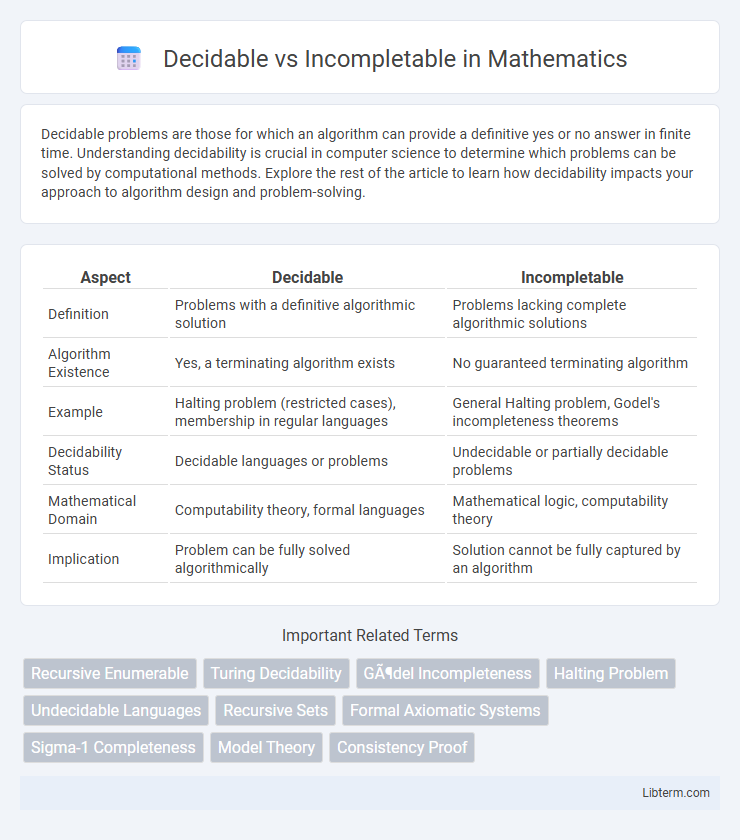Decidable problems are those for which an algorithm can provide a definitive yes or no answer in finite time. Understanding decidability is crucial in computer science to determine which problems can be solved by computational methods. Explore the rest of the article to learn how decidability impacts your approach to algorithm design and problem-solving.
Table of Comparison
| Aspect | Decidable | Incompletable |
|---|---|---|
| Definition | Problems with a definitive algorithmic solution | Problems lacking complete algorithmic solutions |
| Algorithm Existence | Yes, a terminating algorithm exists | No guaranteed terminating algorithm |
| Example | Halting problem (restricted cases), membership in regular languages | General Halting problem, Godel's incompleteness theorems |
| Decidability Status | Decidable languages or problems | Undecidable or partially decidable problems |
| Mathematical Domain | Computability theory, formal languages | Mathematical logic, computability theory |
| Implication | Problem can be fully solved algorithmically | Solution cannot be fully captured by an algorithm |
Introduction to Decidability and Incompleteness
Decidability refers to the ability of an algorithm to determine the truth or falsity of a statement within a finite amount of time, typically studied through decision problems in computational theory. Incompleteness, highlighted by Godel's incompleteness theorems, shows that in any sufficiently powerful formal system, there exist true statements that cannot be proven within that system. Understanding the contrast between decidability and incompleteness is crucial for exploring the limits of computation, logic, and formal mathematical systems.
Formal Definitions: Decidable Problems
Decidable problems refer to decision problems for which an algorithm exists that can provide a yes or no answer for every input instance within a finite amount of time, ensuring termination and correctness. Formally, a problem is decidable if it corresponds to a recursive set, meaning that its characteristic function is computable. In contrast, problems that are not decidable fall into the category of undecidable or incompletable problems, where no such algorithm can guarantee termination for all inputs.
Formal Definitions: Incompletable Theories
Incompletable theories are formal systems where no consistent and complete extension exists, meaning they cannot be augmented to decide every statement within their language. These theories lack recursive enumerability for all their truths, preventing the construction of a complete axiomatization. This contrasts with decidable theories, where algorithms can determine the truth or falsity of any statement effectively.
Historical Background and Key Contributors
Decidability and incompleteness emerged from foundational research in mathematical logic during the early 20th century, with Alonzo Church and Alan Turing pioneering the concept of decidability through the formulation of the Entscheidungsproblem and the Turing machine model. Kurt Godel's incompleteness theorems, published in 1931, fundamentally challenged the notion that all mathematical truths could be algorithmically determined, establishing that any sufficiently powerful formal system is inherently incomplete. The collaborative advancement of these key figures shaped the modern understanding of computability and formal logic limits.
Turing Machines and Computability
Decidable problems in computability theory are those for which a Turing machine can provide a definite yes or no answer after a finite number of steps, exemplified by the halting problem restricted to certain inputs. In contrast, incompletable problems lack any algorithmic procedure that guarantees a decision in every case, often linked to the halting problem in its general form. These concepts underpin the limits of algorithmic computation, where decidability defines computational feasibility and incompleteness highlights inherent computational boundaries.
Gödel’s Incompleteness Theorems
Godel's Incompleteness Theorems demonstrate that in any sufficiently powerful formal mathematical system, there exist true statements that are undecidable, meaning they cannot be proven or disproven within the system. These theorems establish the inherent incompleteness of formal systems capable of encoding basic arithmetic, highlighting the distinction between decidable propositions, which have algorithmic proof procedures, and undecidable ones. This foundational result implies limitations on the scope of formal axiomatic methods in mathematics and logic.
Differences Between Decidable and Incompletable Systems
Decidable systems are characterized by algorithms that can determine the truth value of any statement within a finite time, ensuring all problems are algorithmically solvable. Incompletable systems, on the other hand, lack the capacity to produce complete solutions or proofs for all propositions, often due to inherent undecidability or complexity limitations. The key difference lies in decidable systems guaranteeing conclusive outcomes for all inputs, whereas incompletable systems encounter statements that remain undecidable or unsolvable within the system's framework.
Real-World Examples and Applications
Decidable problems, such as determining the primality of a number or verifying program termination in fixed cases, have algorithms that always provide a yes or no answer within finite time, making them applicable in cryptography and software verification. Incontrast, incompletable problems like the Halting Problem lack general algorithms for conclusive answers, highlighting limitations in automated reasoning and influencing the development of heuristic methods in artificial intelligence. Understanding this dichotomy guides the design of systems that balance computational guarantees with practical applicability in fields like data analysis and machine learning.
Implications for Computer Science and Logic
Decidable problems can be algorithmically solved, ensuring that computers determine definitive yes or no answers within finite time, which underpins automated reasoning and software verification. Incompletable problems, often linked to Godel's incompleteness theorems, reveal limitations where certain truths cannot be proven within a system, impacting formal logic and computational theory. Understanding these distinctions guides the development of efficient algorithms and highlights inherent constraints in artificial intelligence and formal proof systems.
Future Directions and Open Questions
Future directions in the study of decidable versus incompletable problems emphasize the refinement of complexity class boundaries and the exploration of novel algorithmic frameworks that can address currently undecidable cases. Open questions involve identifying new subclasses of incompletable problems that may admit approximations or partial solutions, as well as developing formal methods to better characterize the transition from decidability to undecidability. Advancements in quantum computing and machine learning could provide unexpected insights into longstanding open problems in computability theory.
Decidable Infographic

 libterm.com
libterm.com